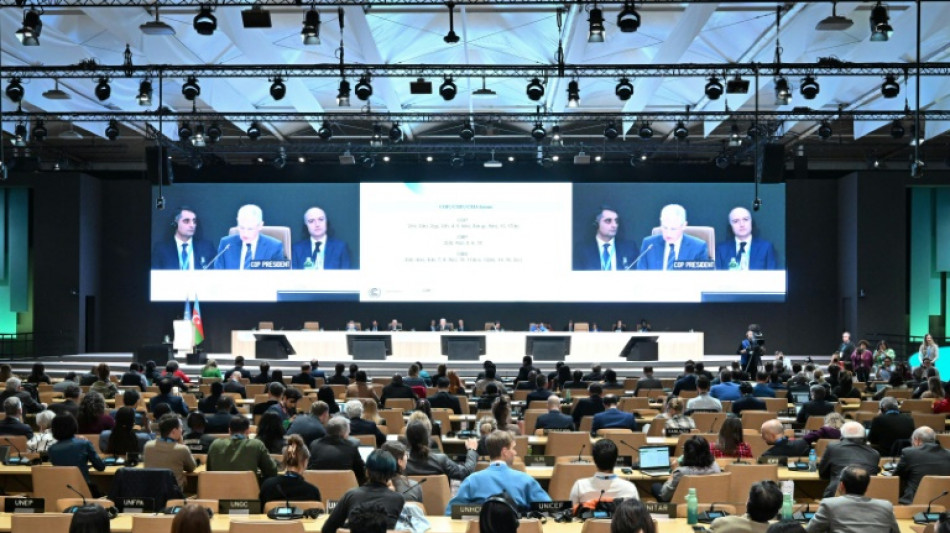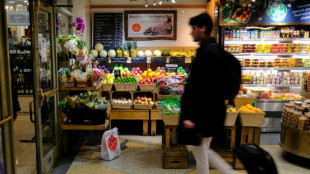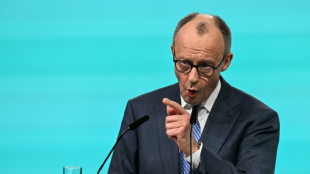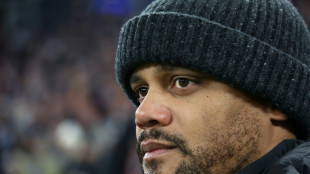
-
 US military assets in the Middle East
US military assets in the Middle East
-
Neymar hints at possible retirement after World Cup

-
 Stocks rise after court ruling against US tariffs
Stocks rise after court ruling against US tariffs
-
Australia end dismal T20 World Cup by thrashing Oman

-
 Olympics chief says Milan-Cortina has set new path for Games
Olympics chief says Milan-Cortina has set new path for Games
-
Russian SVR spy agency took over Wagner 'influence' ops in Africa: report

-
 Pegula fights back to sink Anisimova and reach Dubai final
Pegula fights back to sink Anisimova and reach Dubai final
-
Trump administration denounces 'terrorism' in France after activist's killing

-
 Colombia's Medellin builds mega-prison inspired by El Salvador's CECOT
Colombia's Medellin builds mega-prison inspired by El Salvador's CECOT
-
German broadcaster recalls correspondent over AI-generated images

-
 US Supreme Court strikes down swath of Trump global tariffs
US Supreme Court strikes down swath of Trump global tariffs
-
England's Itoje says managing 'emotional turmoil' key to 100 cap landmark

-
 Trump says weighing strike on Iran as Tehran says draft deal coming soon
Trump says weighing strike on Iran as Tehran says draft deal coming soon
-
Tudor is '100 percent' certain of saving Spurs from relegation

-
 Azam dropped for scoring too slowly, says Pakistan coach Hesson
Azam dropped for scoring too slowly, says Pakistan coach Hesson
-
Stocks volatile after soft US growth data, court ruling against tariffs

-
 Italy bring back Capuozzo for France Six Nations trip
Italy bring back Capuozzo for France Six Nations trip
-
From Malinin's collapse to Liu's triumph: Top Olympic figure skating moments

-
 Arteta urges Arsenal to 'write own destiny' after title wobble
Arteta urges Arsenal to 'write own destiny' after title wobble
-
Ukraine Paralympics team to boycott opening ceremony over Russian flag decision

-
 Wales captain Lake wants fans to bring 'noise' against Scotland
Wales captain Lake wants fans to bring 'noise' against Scotland
-
Skier Vonn's Italian hospital a hotbed of men, sister says

-
 India target S.Africa top order, Abhishek to come good: bowling coach
India target S.Africa top order, Abhishek to come good: bowling coach
-
Carrick praises Man Utd 'diversity' after Ratcliffe's immigrant rant

-
 I never thought it would be hit, says 'Scream' creator 30 years later
I never thought it would be hit, says 'Scream' creator 30 years later
-
AI summit statement delayed to 'maximise' signatories: India

-
 Barcelona's Sagrada Familia basilica hits peak height
Barcelona's Sagrada Familia basilica hits peak height
-
Milan sprints to second straight UAE stage win as Tiberi keeps lead

-
 US GDP growth misses expectations as Trump blames shutdown
US GDP growth misses expectations as Trump blames shutdown
-
Benfica investigate video of fans' monkey gestures

-
 French minister pledges tight security at rally for killed activist
French minister pledges tight security at rally for killed activist
-
Guardiola 'couldn't care less' about Arsenal stumble in title race

-
 UK police search property as royals reel from Andrew's arrest
UK police search property as royals reel from Andrew's arrest
-
Germany's Merz to visit China next week

-
 Kompany says Mourinho made 'huge mistake' in Vinicius racism row
Kompany says Mourinho made 'huge mistake' in Vinicius racism row
-
X appeals EU's 120-mn-euro fine over digital content violations

-
 Galthie recalls hulking locks Flament, Meafou for Italy
Galthie recalls hulking locks Flament, Meafou for Italy
-
Turkey, Saudi sign major solar power deal

-
 US Olympic freeskier Hess embraces 'loser' tag after Trump blast
US Olympic freeskier Hess embraces 'loser' tag after Trump blast
-
European stocks rebound, oil prices ease after US-Iran volatility

-
 'Alpha male' AI world shuts out women: computing prof Hall
'Alpha male' AI world shuts out women: computing prof Hall
-
New Zealand freestyle skier Ives in hard Olympic crash

-
 New Zealand must adapt quickly to Sri Lanka wickets: Chapman
New Zealand must adapt quickly to Sri Lanka wickets: Chapman
-
Thai activist's jail term for royal insult extended to 30 years

-
 Families of Duterte's drug war victims eye Hague hearing with hope
Families of Duterte's drug war victims eye Hague hearing with hope
-
India chases 'DeepSeek moment' with homegrown AI

-
 UN touts panel for 'human control' of AI at global summit
UN touts panel for 'human control' of AI at global summit
-
Ukraine Paralympics team to boycott Opening Ceremony over Russian flag decision: statement

-
 UK monarchy reels from Andrew's stunning arrest
UK monarchy reels from Andrew's stunning arrest
-
Somaliland, where Muslims love Israel


Doubts over climate funding as donors squeeze aid
There are growing doubts about a pledge by rich nations to provide more climate finance to poorer nations, as foreign aid budgets are slashed and the US guts environmental spending.
Richer nations committed at the UN COP29 summit in November to boost spending on climate action in developing countries to $300 billion a year by 2035, an amount decried as woefully inadequate.
Since then, President Donald Trump has frozen US contributions to the global pot and withdrawn from a funding deal to help developing nations transition to clean energy, among other climate initiatives.
The UK, meanwhile, has trimmed overseas aid to raise defence spending, following a slew of similar cuts by climate-friendly governments in Europe.
Diplomats and analysts say it remains unclear where the axe may fall, but there are fears that money earmarked for climate finance could be on the chopping block.
Laetitia Pettinotti, a climate economist from the think tank ODI Global, told AFP that signs are not good and cuts could be expected.
"It's really hard to see where the money is going to come from," she said.
- Difficult road -
With the United States halting its climate action, expectations have fallen largely on the European Union, historically the third-largest producer of greenhouse gases, and the biggest contributor to climate finance.
But the 27-nation bloc is under budget strain, facing US tariffs and trying to ramp up military spending to defend itself and Ukraine, and reduce strategic reliance on Washington.
Recent elections meanwhile have seen right-wing populists hostile to climate policies make gains across the continent.
France, Germany, Netherlands, Belgium and the United Kingdom have all announced recent aid cuts as economic and security priorities shift and budget pressures take hold.
The EU "needs to find a new way to prioritise its limited resources, for very legitimate reasons", said Li Shuo, a climate analyst at the Asia Society Policy Institute.
"This will make the climate finance discussion very difficult."
- 'Worrying trends' -
Azerbaijan, which hosted the COP29 summit where the $300-billion deal was brokered, is seeking reassurances at a two-day meeting of climate negotiators in Tokyo that ends on Thursday.
Yalchin Rafiyev, the country's top climate diplomat, said he would be asking developed nations if the cuts impacted money "they were thinking or planning to allocate for climate or not".
"We are not sure yet. There was not any concrete kind of climate fund cuts that we have heard from any of the parties. There was only some worrying trends," he told AFP.
He added: "We are opposed to any kind of action that can reduce the funding for climate action."
Brazil, which is hosting this year's COP30 summit, said it was exploring ways to raise the enormous sums needed for developing countries to wean off fossil fuels and adapt to global warming.
According to independent experts, these countries -- excluding China -- will require $1.3 trillion a year in outside assistance by 2035 to meet their climate needs.
Under the Paris Agreement, developed countries -- those most responsible for global warming to date -- are obligated to pay climate finance, but other countries do make their own voluntary contributions.
"Climate finance for developing countries was already insufficient, but the recent cuts to foreign aid budgets represent a renewed challenge," the COP30 presidency said in a written statement to AFP.
- 'Not looking good' -
Donors have struggled to meet their climate finance pledges at the best of times, even for commitments well below the $300 billion pledged last year.
Developed nations provided about $116 billion in 2022, the latest year for which official OECD climate finance figures are available.
The US provided about 10 percent of that money. Trump's spending freeze means other contributors will have to make up the difference.
Other ways to possibly plug the shortfall -- such as greater lending from multilateral development banks like the World Bank -- are also in doubt.
"You're going to hear more and more that there simply isn't money out there to fill up such a big pot... it's not looking good," Avantika Goswami, climate change lead at the Centre for Science and Environment in India, told AFP.
O.M.Souza--AMWN


